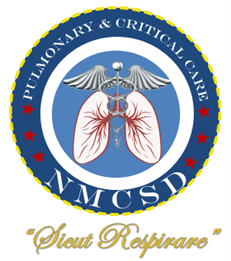- Rotation Director: Dan Crouch, MD
- Rotation Locations: UCSD Hillcrest Medical Center, UCSD Jacobs Medical Center
- Rotation Duration: One 4-week block
- Trainees/month: One
Rotation Description:
The Medical Intensive Care Unit at UCSD Medical Center provides trainees with experience in the management of a diverse group of critically ill patients; experience in procedural and technical skills necessary for competency in critical care medicine, including indications, contraindications, complications and limitations of these procedures; experience in coordinating a multidisciplinary team involving nursing, respiratory therapists, physical therapists pharmacists, and nutritional services; and experience in ethical related to critical care medicine including palliative.
Rotation Objectives:
- Establish knowledge and competence in:
- Establishment and maintenance of open airway in nonintubated patients
- Various modes of ventilation
- Various modes of non-invasive ventilation
- Weaning from mechanical ventilatory support
- Management of pneumothorax
- Maintenance of circulation including various forms of shock
- Respiratory mechanics, gas exchange, and respiratory drive
- Calibration and operation of hemodynamic recording systems
- Examination and interpretation of diagnostic specimens
- Interpretation of diagnostics studies including chest radiography, CT scanning, pulmonary angiograms, radiouclide scans, and other radiologic procedures
- Establish competence in critical care instrumentation and procedures:
- Laryngosopic and bronchoscopic intubation
- Ventral venous catheter insertion including dialysis catheters
- Swan Ganz catheter insertion and interpretation
- Tube thoracostomy
- Bronchoscopy
- Ventilator management
- Paracentisis, pericardiocentesis, and thoracentesis
- Intracranial pressure monitoring
- Dialysis: peritoneal, intermittent, and continuous
- Cardiac output procedures
- Calculation of oxygen content, oxygen delivery, shunt, and alveolar-arterial gradient
- Utilization, zeroing and calibration of pressure transducers
- Use of amplifiers and recorders
- Acquire knowledge and clinical competence in the following content areas:
- Pathophysiology, molecular biology, and therapy of disorders of the cardiovascular, respiratory, renal, gastrointestinal, genitourinary, neurologic, endocrine, hematologic, musculoskeletal, and immune systems as well as infectious disease.
- Electrolyte and acid-based disorders
- Metabolic, nutritional, and endocrine consequences of critical illness
- Hematologic and coagulation consequences of critical illness
- Critical obstetric and gynecologic disorders
- Management of the immunocompromised patient
- Management of anaphylaxis and acute allergic reactions
- Trauma
- Pharmacokinetics and drug metabolism in critical illness
- Use of sedative and paralytic agents
- Ethical, economic, and legal aspects of critical illness
- Psychosocial and emotional effects of critical illness
- Iatrogenic and nosocomial problems in critical care medicine
- OSHA requirements and universal precautions
Learning Venues and Teaching Methods:
Direct Patient Care:
- Medical Intensive Care Unit, 9th and 10th floor main hospital
- Burns Intensive Care Unit, 5th floor main hospital
- Surgical Intensive Care Unit, 2nd floor main hospital
- Emergency Room, 1st floor main hospital
Task Trainer:
- Intubation model, 2nd floor Anesthesiology Conference Room
- Bronchoscopy model, Special Procedures Unit
Suggested reading:
- Textbook of Critical Care, Edited by Shoemaker, Ayres, Grenvik and Holbrook. W.B. Saunders and Company
- Critical Care, Edited by Civita, Taylor, and Kirby. Lippincott and Raven
- Intensive Care Medicine, Edited by Rippe, Taylor, Alpert, and Fink. Little Brown
- Textbook of Respiratory Medicine, Edited by Murray and Nadel. W.B. Saunders and Company
- Pulmonary Artery Catheter Education Project. http://www.pacep.org/
Evaluation:
The trainee will receive a written evaluation at the end of their rotation based on cognitive, patient management, procedural and humanistic skills. This evaluation, including areas for improvement, will be discussed personally with the trainee at the end of the rotation and then forwarded to the Education Committee for inclusion in the trainee’s permanent file.
